When Chicago-based indie rock band Ratboys released the excellent new album PRINTER’S DEVIL last month, it would be more than fair to say life was a little bit different than it is now. The album shows off a wide mastery of styles, from ‘90s indie rock scorchers to contemplatively fingerpicked folk songs to droll alt-country. Ratboys embrace a general lyrical theme of feeling small and out of control in one’s life, and of coping with that feeling. Steiner does that by exploring memories of childhood, ruminations on popular culture and historical figures, and ending with equating herself with the “printer’s devil”—once a term for a young apprentice in a printer’s press. We’re all a part of this larger story, and we all have a hand in writing it, but ultimately, we’re at the mercy of powers larger than ourselves, and that knowledge inspires fear, awe, and occasional peace of mind.
What an album to carry into the new age of social distancing and self-quarantine.
Julia and I spoke on the phone on March 17th, just a few days after Ratboys and many other bands were forced to cancel tour dates, a development that presents major challenges in a world where independent musicians are so reliant on touring. In the days since we spoke, Ratboys canceled several additional dates, and multiple states have ordered their residents to stay at home outside of essential errands like food shopping and work obligations. Since then, they’ve postponed several more dates, but have also announced four Twitch live-stream performances on March 26-29.
Musicians are far from the only people in the world whose livelihoods are about to go up in smoke due to this global calamity—but fortunately, there are things we can collectively do to continue to support them in this time of challenge and, potentially, transition. Julia and I spoke about PRINTER’S DEVIL, as well as the ways in which the musical landscape is shifting, both economically and sonically.
So, it’s a bit of a wild time to have an interview. A lot of live tour dates, yours included, have been canceled or postponed because of the COVID-19 outbreak in the last couple of days—what has it been like to go through that?
Julia Steiner: It’s something we’ve never really experienced before. Touring is something that takes a lot of time to plan for, and we’d worked on these tour dates for months. That’s one thing that I really like about playing music professionally—we plan our lives five or six months ahead so that I can anticipate where I’ll be at a certain time, make plans in my head, make arrangements to see friends. We’re just trying to reorient our lives right now.
It could be a lot worse. We were just thinking about some of our friends who were in the middle of touring when this whole situation unraveled, and luckily we were at home about to leave (for tour) so we—thank God—weren’t stranded anywhere. That makes it so much worse, to have to drive home and to have so much time to be stuck in the van thinking about things. Luckily, we’re able to be at home and figure stuff out where we’re comfortable. We’re really lucky because we have people on our side who are really good and diligent about rescheduling all these things, and hopefully this will all be better by this summer. It’s really hard to know how quickly it’s gonna feel normal again.
Over the last couple of days there’s been a pretty big push toward buying digital records, buying merch, things like that. In an ideal world, what’s the most helpful thing that someone who consumes music can do to help in a crisis like this one?
JS: On a practical level, buying merch is one of the most helpful things you can do. So many people have spoken up about this recently, but touring is the way that 99% of musicians make their entire income, so having to cancel dates has pretty much wiped out our income stream. People have been generous about buying merch so far, and that’s been really helpful because it’s kept us busy the last couple of days too.
Part of me feels hesitant to ask people to buy our stuff or to spend money on music right now, because so many people are suffering. So many of my friends work in the service industry, and with those jobs up in the air, a lot of people are kind of screwed right now. If you can’t spend money on an artist’s work right now, I think the best thing you can do is share it with other people. Spending time with the music is so valuable. Obviously, you can’t put a number on that, but at the end of the day, that’s the best thing you can do to support. We’re trying to do that too. Just listen to lots of music and stay present.
It’s great that you guys are able to stay positive through this.
JS: Yeah, we’re going to find ways to perform and stay engaged with people. I’ve been seeing a lot of ideas floating around about Instagram live streams, doing Twitch, things like that. That’s one of the crazy things about this. I’m sure that thousands of the same people are having this conversation at the same time. We need to innovate immediately to find some way to play a show that doesn’t involve anyone leaving their house. And I have a feeling that we might get some sort of technology or format for playing a show out of this whole mess that might change the whole music industry. In the very near future, people might “go on tour” without actually going anywhere. It might have been farther off before, but we’re kind of being forced into getting figured out now. And even after this is over, people are going to find ways to make money and perform without the expenses and risks of leaving home.
Do you feel like that’s a positive change?
JS: Yeah. I’d love to find ways to both travel and play shows and do it from home. I just love to play music and that’s the main reason why it feels good to tour. But if we can play a tour where we travel and play shows for a month and then come home and do shows from home, that would be awesome. You might not have to spend any money on those shows outside of advertising them. We’d still want to tour because we like touring as well, but if there’s a way to create opportunities to have an income outside of streaming or Spotify that involves live performance, but not touring, it would only make the industry stronger.
It seems like, as an outside observer, that’s going to be necessary sooner rather than later. If I were in those shoes, it seems that with the political realm the way it is, it’s going to get harder for bands to be able to financially commit to traveling for a tour and living that lifestyle.
JS: Yeah. We’re lucky because we like touring and we do well on the road as far as our mental health goes. The four of us have been doing this for a long time and the only reason we have been is because we’re somehow able to stay sane. It has a lot to do with our brain chemistry—we’re just lucky to be okay. But I know so many bands who have just had to stop because they couldn’t tour, and if you can’t tour, as much as it sucks, you don’t have as much value to a record label or to your fans. Record labels depend on your outward presentation just as much as your actual music, and your fans want to see you play. There are bands that I love that have just had to stop being bands because it doesn’t work for their mental health to tour. If there’s ever a way for bands to be able to perform where they’re comfortable and healthy, and for them to make money off of that, that would only only bring more great music into the world.
Speaking for myself personally, I know that as much as I try to keep up with new stuff, I think that in a time of crisis like this, I tend to return to music that makes me feel comfortable. Do you have any particular music, whether it’s old or new, that you feel like you’re leaning on right now?
JS: I think there are a few records that are, like, all-time records that will always be there for me and I can listen to them and remember exactly how I’m feeling, and next time I can take myself back to that moment. My favorite record of all time is AGE OF ADZ by Sufjan Stevens, which is extremely chaotic, so I don’t know if that’s what I want to be listening to right now. But that album is just a giant release, so maybe that would help! I’ve been working on getting these merch orders sent out, and just an hour ago Dave put on MGMT’s LITTLE DARK AGE, and that was one of my favorites the year that it came out. It’s so awesome and also a little bit chaotic. I feel like sometimes music that’s just a little bit on the edge is comforting to me and makes me feel like things could be even crazier. Do you have anything like that?
I’ve been falling back on a ton of Roger Harvey lately. If I were to unpack that, I guess it would have to do with this overarching theme of feeling isolated, and the way he deals with that and places it against a particularly modern background. I did actually want to ask you a bit about country music. One thing I’ve been thinking about in relation to country in particular is the expression of the country aesthetic. Thinking of someone like Orville Peck or Lil Nas X who has really internalized the aesthetics of country music and pronounced those things.
When you hear your music, you can hear a lot of country in that sound, and I think you can say that about a lot more bands than most people talk about, but your sound in particular seems to have a strong spiritual connection to country, even if it’s not necessarily the “end goal.” We’re kind of in this period where we’ve got a lot of interesting interpretations of what country music, at its core, actually is. Do you feel like you have a place in that? Do you feel like you want to have a place in that?
JS: I think so. I was born in 1992, and when I was growing up and well into my adolescence, the country music stars that I looked up to were people like the Dixie Chicks, and Shania Twain, and Faith Hill. Lots of really powerful women who had a really poppy sound, but were also full of confidence. I think the main aspects we carry forward with country music are the instrumental qualities. We’ve never used a fiddle or anything like that, but we’ll use some steel guitar and a lot of the same chord progressions. And also, the storytelling aspect is what really draws me to it. Especially with old country music. People like Johnny Cash, or even someone like Bob Dylan, would have songs that are dedicated to telling stories in straightforward ways, and I’m really into that. The example that comes to mind immediately is the Dixie Chicks’ “Goodbye Earl,” and that’s one of the best songs ever written in my opinion. It’s the epitome of what country can do in terms of telling a story, and it provides so much joy. There’s so many turbulent emotions just bouncing off a wall! It’s so awesome.
I think there’s a lot more to country music than just a cowboy hat or an accent, but at the same time, it’s awesome that people have started to take those parts and turn it into something new. That’s how it should be. Genres are meant to be meaningless and that’s something that I love watching. And I do feel like we’re a part of that. I played a solo show a few weeks ago and I tried out a couple of new songs. They’re all pretty simple, and my friend said to me “Yo, those are country songs!” It’s like they say—just three chords and the truth. I hadn’t really even thought of them as country songs, but I think that’s what it is in essence. Just a straightforward musicality and telling a good story.
I think one of the things that stands out about modern country, and is maybe a bit disappointing about the way women in country are treated today, is that for people who were growing up around country around that time in the mid-90s, a lot of the artists you mentioned were our first exposures to what we’ve come to know as feminism. If you were a little kid listening to country in the late 90s and early 2000s, hearing music like the Dixie Chicks alongside the Toby Keiths of the world really planted a lot of seeds in our minds, and it’s cool that you call attention to that too.
JS: I mean, when you think about it, “Goodbye Earl” is shocking. The idea that a woman could sing openly about helping her friend kill her abuser—if you’d written that in the ‘70s, people would have just laughed at you or slammed the door on you! I wish there were more political women in country music right now. Taylor Swift was kind of late to the game on that, and she’s not really even a country artist anymore, and Kacey Musgraves kind of filled that void at first, I thought. She writes songs that aren’t all about relationships, and I really love that about her. Her older records sound like early Taylor Swift, but the songs are about homelessness and poverty and weed and that’s really cool. I feel like there’s room for that now. The Dixie Chicks are back, but I think there’s even more room now for more outspoken, badass women to stand up. I feel like a lot of country music listeners would be open to that nowadays. Not everyone is just completely bought into conservative politics in America anymore. I hope that tradition continues. I don’t think that I’m the person to fill that role, but I hope someone gets super famous and takes a stand in that way.
Nashville seems like it’s just a completely different world from everything else in music. It seems like even the music industry outside Nashville has already shown a desire to see more “outsider-y” country artists like that. Kacey Musgraves, Brandi Carlile, and Sturgill Simpson all got Grammy nods for Album of the Year in the last few years, and none of those records really fit in with most of what comes out of there.
Let’s talk a little bit about PRINTER’S DEVIL. Is there anything in particular on this record that you feel fits into that storytelling tradition?
JS: I think the most specific and direct stories were probably “Victorian Slumhouse” and “Clever Hans.” “Victorian Slumhouse” got its title because it’s about the reality show of the same name, and I wanted to explore the story about how and why that show even exists. It’s the craziest premise to me. It’s sort of a rumination on the artifice of reality TV and how completely concocted and strange it all is. The funny thing is that the most traditional sounding country song is probably “Listening,” but the lyrics to that are a little more vague and not really inviting to anyone at all.
How do you feel about the prospects of inviting people into your songs lyrically? Do you want people to know specifically what’s going on there?
JS: Usually, always. “Listening” was the first song I’ve ever written that wasn’t that way. I don’t want to tell people how to feel when they’re listening to that song, but I wrote it at a time when I was incredibly sad, just in a dark-ass place. I was just writing it for myself, and it felt good to make it intentionally vague and to just let myself feel dejected and not try to prove a point or anything. It’s just kind of there, I guess. So that was the first time when I decided that people could just try to figure out what this means, but there’s really nothing to find! It’s just, like, trauma.
But I especially love being able to write songs about historical figures. We don’t have too many of them, but I love writing those songs and putting all of this information in there that’s maybe a nice lyric on the surface if you don’t know the context, but if you want to dive a little bit deeper and read about the backstory or Google the song title, then the lyrics make a lot more sense and hopefully become more beautiful. “Clever Hans” is like that, because that’s about a horse called Clever Hans, and if you were to Google that and read about him, hopefully the lyrics would take on a new meaning. Most of our songs are about my own personal life, but maybe someday if we have enough songs that are inspired by “real-life” stuff, hopefully people will just Google our song titles and learn about cool stuff.
I feel like songs like that are like little puzzles. I don’t really like doing jigsaw puzzles, but those are the kind of puzzles I like doing. More like lyrical puzzles.
You can listen to PRINTER’S DEVIL here, and be sure to check out Ratboys various livestreams March 26-29!


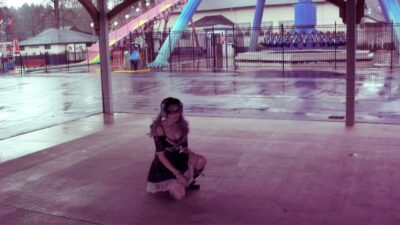
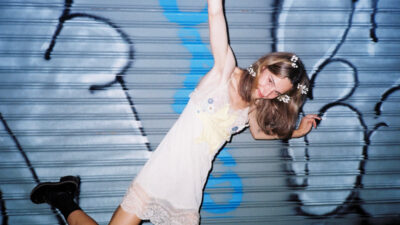
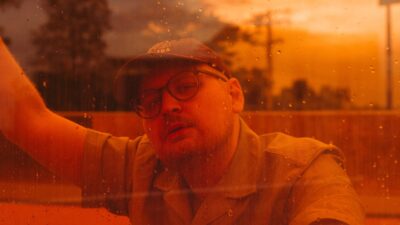
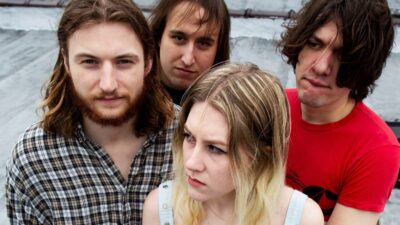

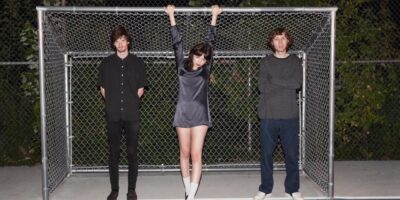

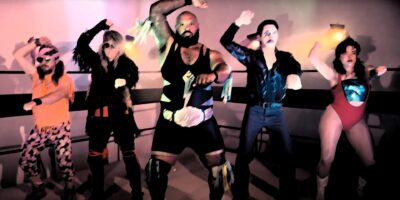

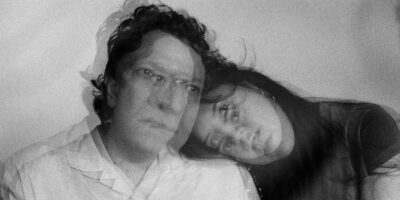




Comments